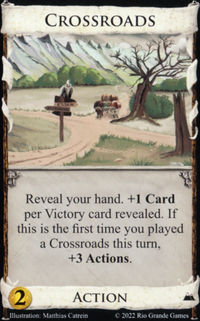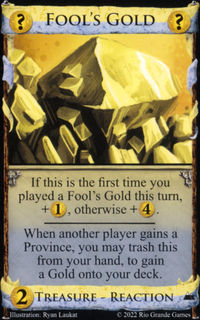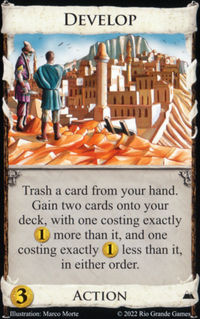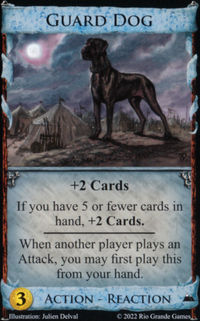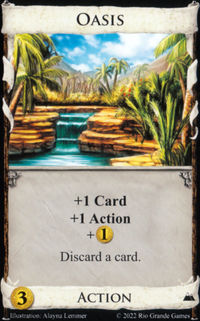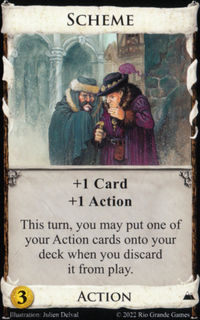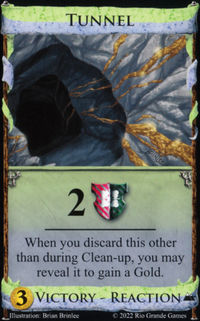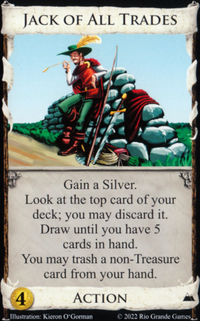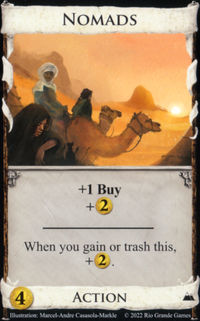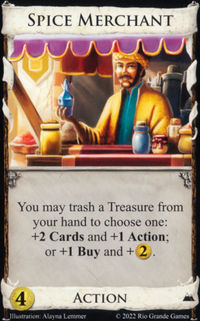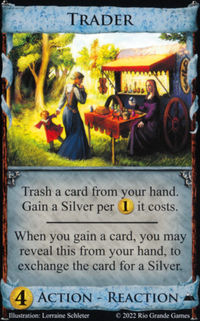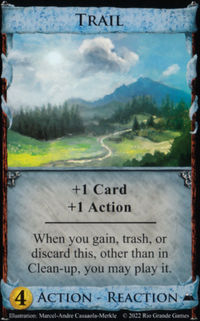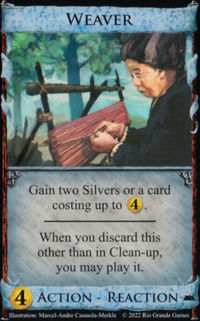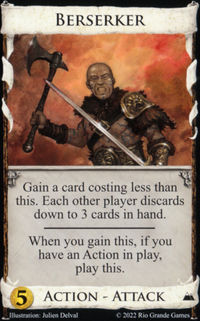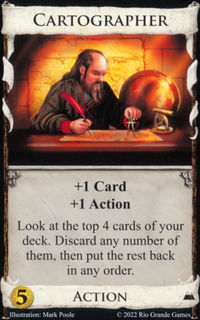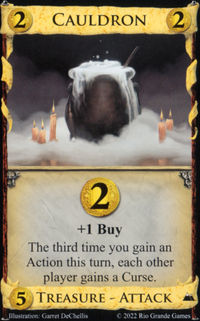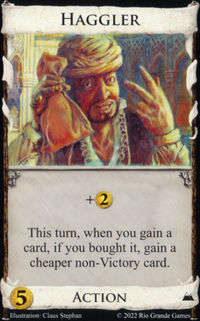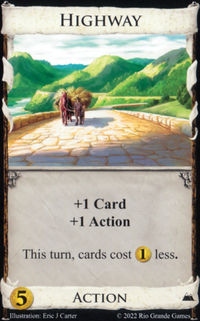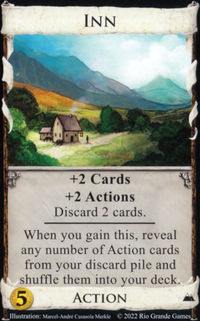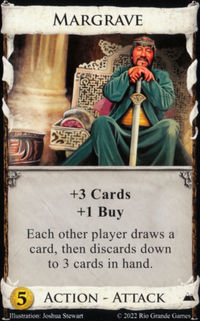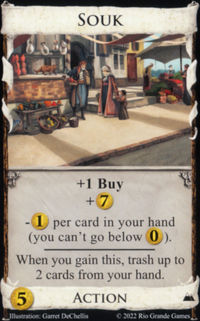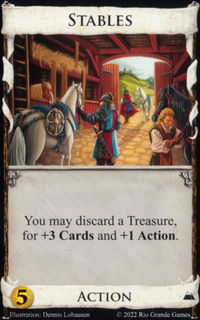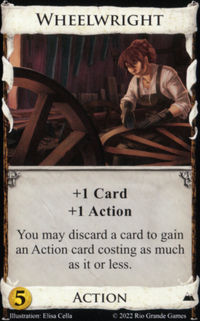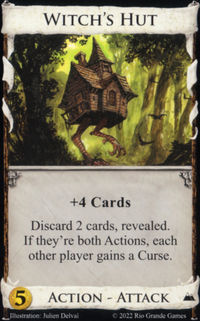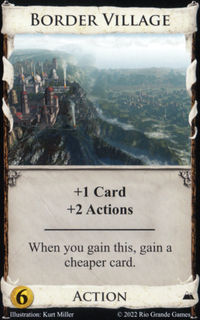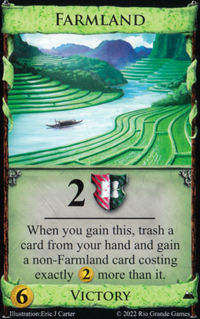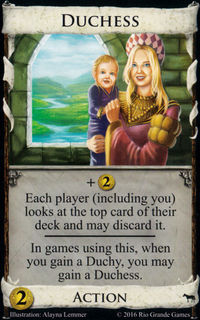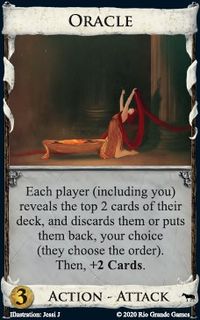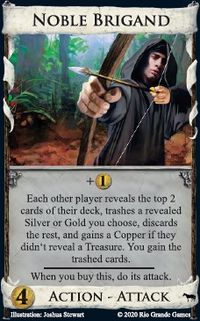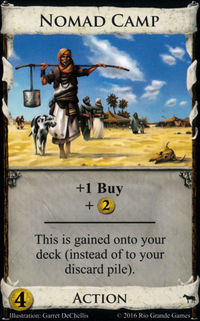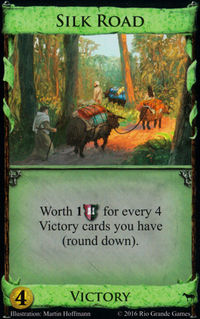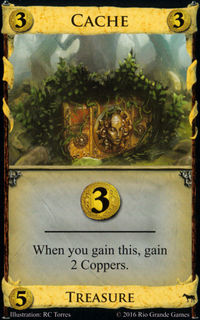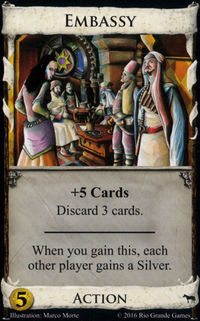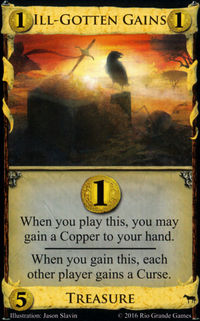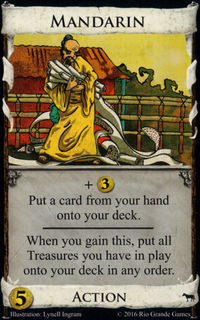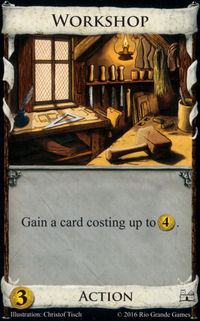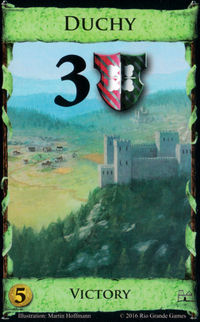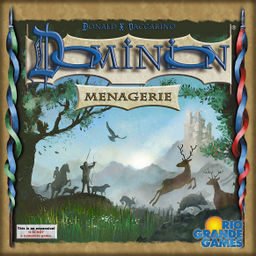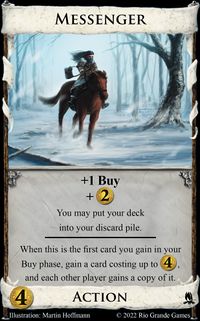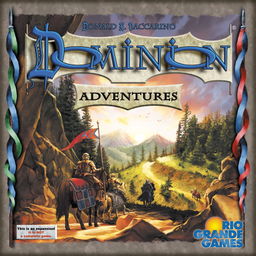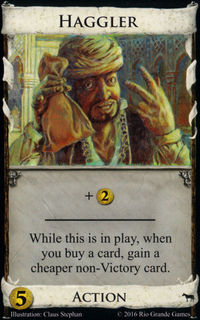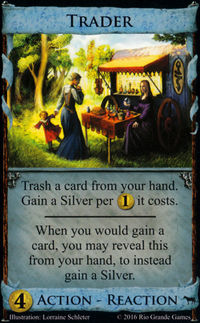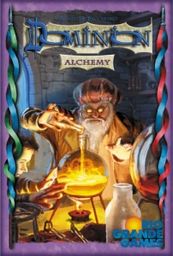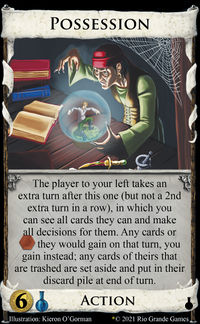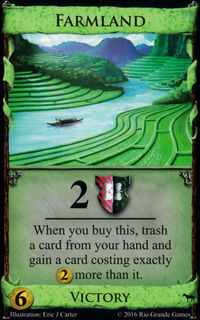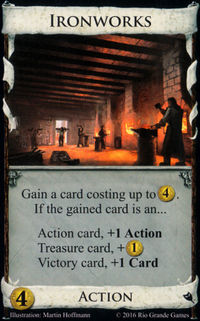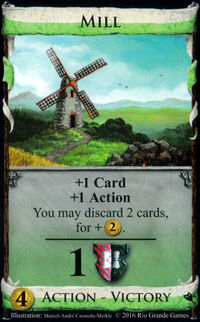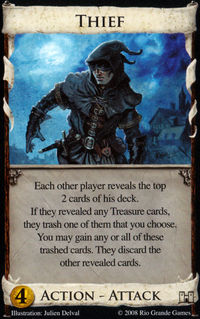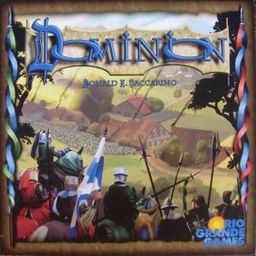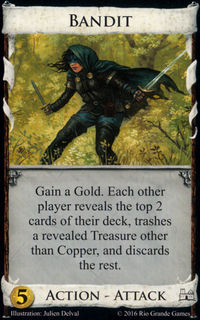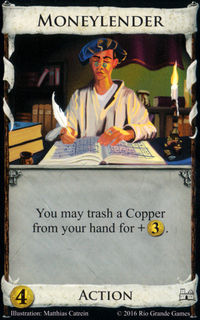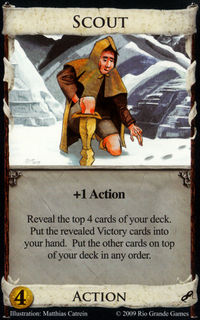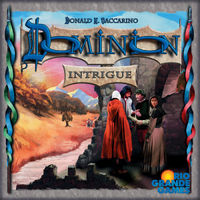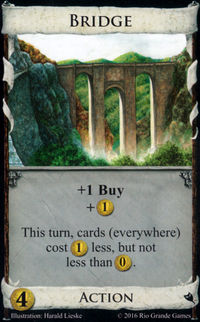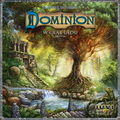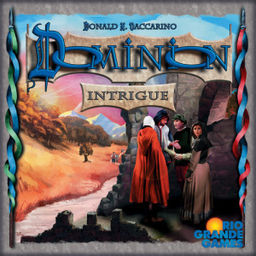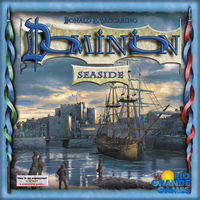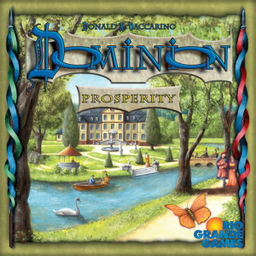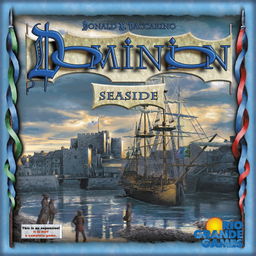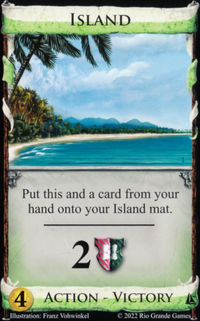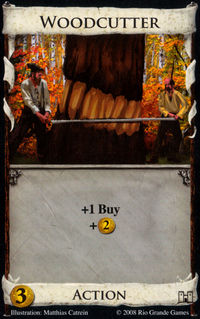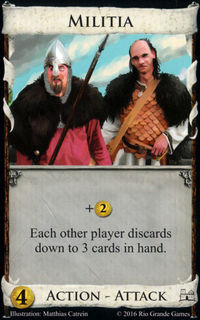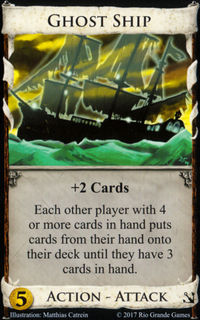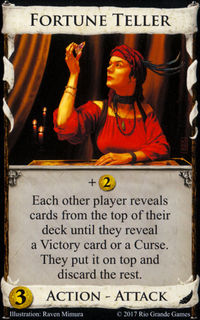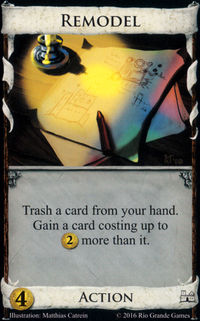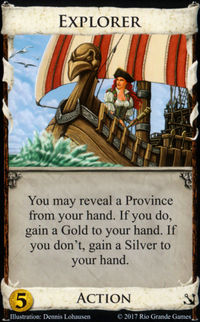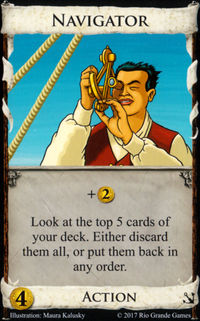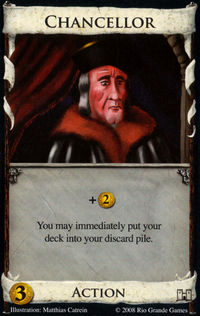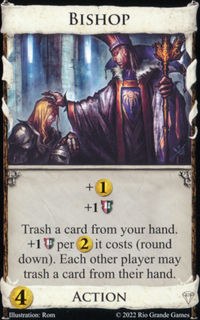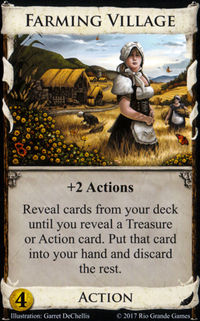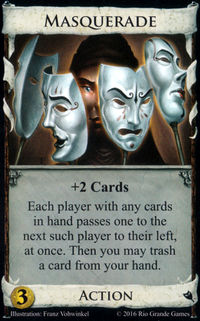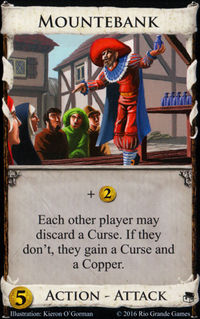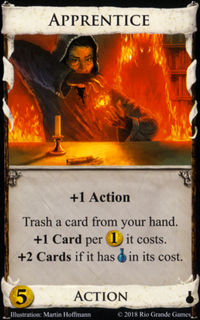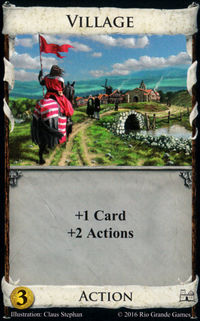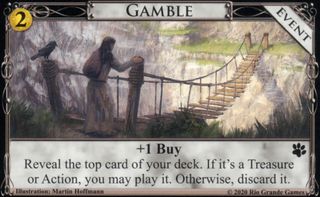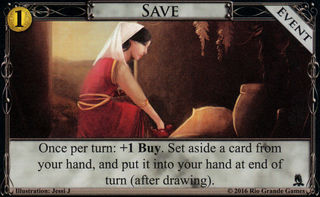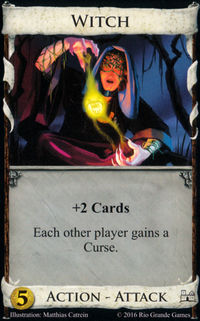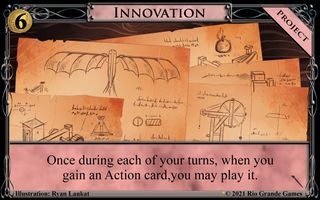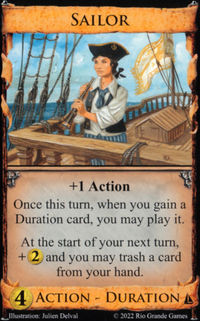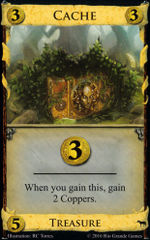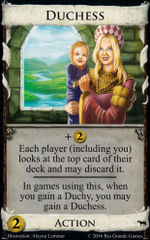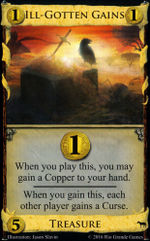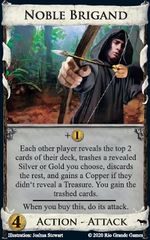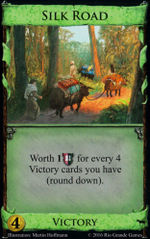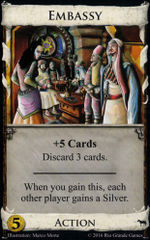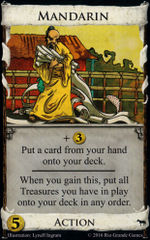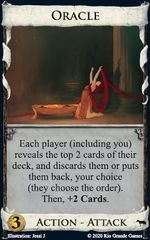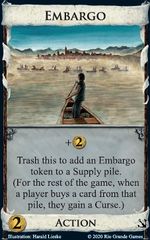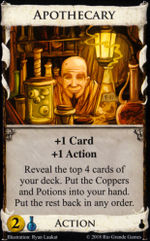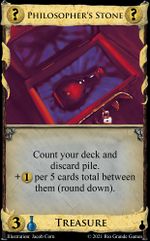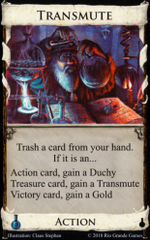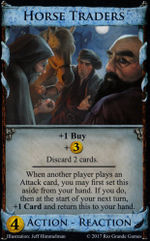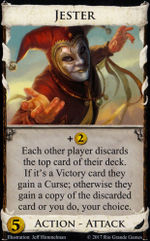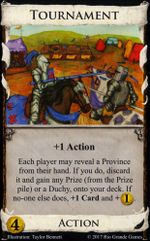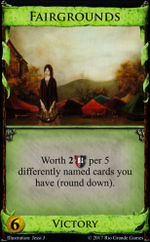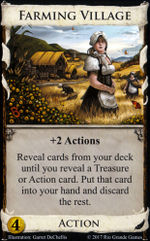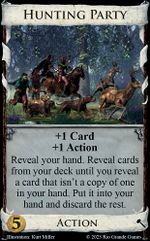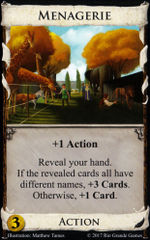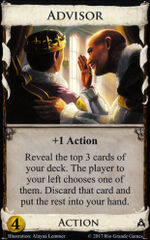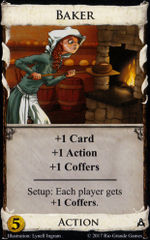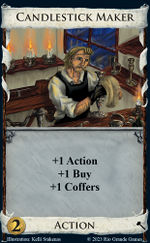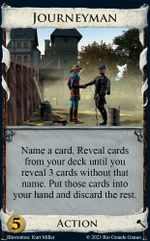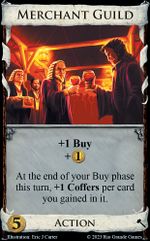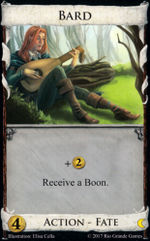Hinterlands
| Hinterlands | |
|---|---|
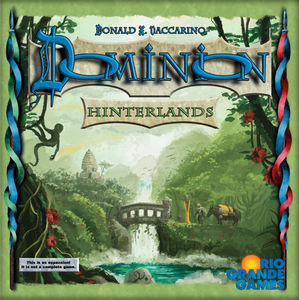 | |
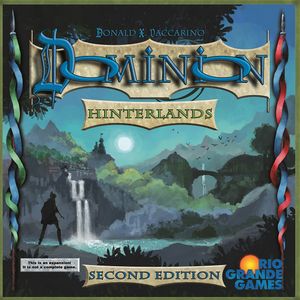 | |
| Info | |
| Type | Expansion |
| Icon |
|
| Cards | 300 |
|
266 (1st) / 264 (2nd) (26 sets) | |
|
26 | |
Blank Card(s) |
8 (1st) / 10 (2nd) |
| Theme(s) |
|
| Release | October 2011 (1st) / July 2022 (2nd) |
| Cover artist | Ryan Laukat (1st), Marcel-André Casasola Merkle (2nd) |
| Official Rulebook | |
Hinterlands is the sixth Dominion expansion, released in October 2011. The box contains 26 sets of Kingdom cards. The basic theme of the set is cards that either have or cause effects when you buy or gain them. Hinterlands offers a balance of engine, Big Money, and alternate VP cards. Since it was originally conceived as a standalone, Hinterlands was deliberately kept on the simpler side, but the "when you gain/buy" mechanic introduced makes the set compelling to novice and experienced players alike.
The second edition of Hinterlands was released in July 2022. It contains 9 new sets of Kingdom cards, which are also available on their own as an update pack, to allow existing Hinterlands sets to be updated to the second-edition form.
The 2011 release of Hinterlands is perceived to have pushed Dominion strategy away from heavily streamlined, small-deck Action engines and toward navigating bulky decks: it emphasizes sifting and Silver-gaining, and has no cards that enable you to thin your deck by more than one card at a time. Hinterlands also emphasizes diversity in Kingdom card types, being the only expansion whose Kingdom cards include multiple Treasures, Reactions, and Victory cards; in the second edition, Donald X. shifted the focus toward Reaction cards specifically, of which Hinterlands now has six.
[edit] Contents
[edit] Kingdom cards, second edition
Cards with an asterisk (*) were added in the second edition.
- : Crossroads, Fool's Gold
- : Develop, Guard Dog*, Oasis, Scheme, Tunnel
- : Jack of All Trades, Nomads*, Spice Merchant, Trader, Trail*, Weaver*
- : Berserker*, Cartographer, Cauldron*, Haggler, Highway, Inn, Margrave, Souk*, Stables, Wheelwright*, Witch's Hut*
- : Border Village, Farmland
[edit] Removed first-edition Kingdom cards
These cards were included in the first edition, and removed from the second edition.
- : Duchess
- : Oracle
- : Noble Brigand, Nomad Camp, Silk Road
- : Cache, Embassy, Ill-Gotten Gains, Mandarin
[edit] Additional second-edition rules
[edit] When Gained
- Many cards in Hinterlands do something "when you gain" that card or another card.
- You can gain a card by gaining it directly, such as with Workshop, or by buying it.
- "When you gain this" happens directly after you gain the card; the card will be in your discard pile already (or wherever else it was put) when you resolve that ability.
- When playing a card, its "when you gain" ability no longer does anything.
- Examples:
- You buy Border Village, you gain it. Its ability happens; you gain a cheaper card. You choose to gain Souk. Souk's "when you gain this" ability happens, and you may trash up to 2 cards from your hand.
- You play Haggler, then buy Border Village, gaining it. Its ability happens and you gain a Duchy. Haggler's ability also happens, and you choose to gain another Haggler for gaining the Border Village. Haggler doesn't give you another card for gaining the Duchy or the Haggler, since Haggler only cares about you gaining cards that you bought.
- You play Border Village. You get +1 Card and +2 Action. You do not gain a card; that only happens when you gain Border Village, not when you play it.
[edit] When Discarded
- Hinterlands has three cards that can do something when discarded: Trail, Tunnel, and Weaver.
- You cannot simply choose to discard these cards; something has to let you or make you discard them, to activate those abilities. The key thing to look for is a card actually telling you to "discard" cards.
- These abilities can happen on your own turn (such as due to Oasis), or on someone else's (such as due to Margrave). They do not happen in Clean-up, when you normally discard all of your played and unplayed cards.
- These abilities work when the card is discarded from anywhere - for example, from your hand (such as due to Oasis) or from your deck (such as due to Cartographer), or from being in Exile (a mat from Dominion: Menagerie).
- If the card would not necessarily be revealed (such as when discarding multiple cards to Cartographer), you have to reveal it to make the ability happen.
- These abilities are optional, even if the card was already revealed for some other reason.
- These abilities do not function if cards are put into your discard pile without being discarded, such as when you gain a card, or when your deck is put into your discard pile (such as with Messenger from Dominion: Adventures).
- These abilities only happen once per time the card is discarded - you can't discard one Tunnel and reveal it twice for two Golds.
- If you discard multiple cards at once (e.g. to Margrave), they are all discarded at once, and then the abilities happen one at a time. This means for example that if you discard two Trails to a Margrave, and playing the first Trail causes you to shuffle, you won't be able to reveal the second Trail (as it's lost in your deck at that point).
Additional first-edition rules |
|
[edit] Flavor text
[edit] Cards gallery
[edit] Kingdom cards
[edit] Removed cards
[edit] Impact
[edit] Reviews
Here are some articles and reviews of Hinterlands:
- Hinterlands Speculation
- Staggered Release Discussion
- Full List Leak Discussion
- Three Sentence Overviews.
[edit] Engines
Hinterlands introduced a number of cards which are popular in building engines:
- Scheme: Allows you the ability to top-deck actions played last turn.
- Highway: Cost reduction encourages megaturn strategies.
- Crossroads: The card is a cheap source of +Actions.
- Border Village: Allows you to gain both a village and a powerful card costing .
- Haggler: Acts as a pseudo +Buy, giving you a cheaper extra card (perhaps a cantrip or village) to go with your main purchase. It also lets you continue to build while buying Victory cards.
- Inn: A village which is particularly good when much of the deck is discarded, to play multiple Actions in the same turn.
[edit] Big money
The expansion offered three cards which are relatively effective for big money strategies:
- Jack of All Trades: A solid big money card because of its ability to both gain Silver and trash your starting Estates or Curses.
- Embassy: A card that combines large terminal draw and sifting.
- Oracle: A weak draw card, offset somewhat by its Attack and sifting ability.
[edit] Rushes
Hinterlands has two cards which will often lead to rush strategies:
- Silk Road: An easy rush option with Workshop or Ironworks. The card gains a lot of power with the presence of cheap alternate VP such as Tunnel or Mill.
- Ill-Gotten Gains: Finishing off the Ill-Gotten Gains pile will typically empty the Curse pile at the same time. Estate or Duchy is typically the third pile to be emptied in these rushes.
[edit] Silver
There seems to be a consensus in the Dominion community that Hinterlands increased the importance of Silver relative to the other expansions:
- Jack of All Trades: Displayed the power of gaining Silver for simple big money strategies.
- Trader: Showed the potential of flooding your deck with Silver.
- Silk Road: A way to easily gain Silver is often all that is needed to enable a Silk Road rush.
[edit] "Fixes"
Hinterlands introduced cards that can, in a broad sense, be considered "better" versions of earlier cards - that is, an attempt was made to "fix" what seemed to be problems with the original cards.
- Noble Brigand: A "better" Thief, since it doesn't trash Copper (and in fact distributes them), and gives virtual coin. However, it cannot gain more exotic Treasures. (Thief was later removed from the Base set and replaced with another "fix", Bandit.)
- Spice Merchant: A "better" Moneylender, that is more flexible, both in what it can trash, and what it does after trashing, though it does not give as much +.
- Cartographer: A "better" Scout, it discards from your deck instead of drawing Victory cards, and also draws a card, though it costs more. (Scout was later removed from Intrigue.)
- Highway: A "better" Bridge, it brings costs down much more easily given its cantrip nature (and thus is much better for tricks requiring cost-reduction), but is more expensive and does not give +Buy.
[edit] Theme
Game designer Donald X. offered some insight into some themes of the set here.
- 9 effects when gained/bought: Noble Brigand, Nomad Camp, Cache, Embassy, Ill-Gotten Gains, Inn, Mandarin, Border Village, Farmland
- 4 other interaction with gain/buy: Duchess, Fool's Gold, Trader, Haggler
- 7 Victory/Treasure/Reaction: Fool's Gold, Tunnel, Silk Road, Trader, Cache, Ill-Gotten Gains, Farmland
- 4 interact with Victory cards: Crossroads, Duchess, Fool's Gold, Silk Road
- 8 card filtering: Oasis, Oracle, Jack of All Trades, Cartographer, Embassy, Inn, Margrave, Stables
[edit] Alternative versions
Polish edition (by IUVI Games)
[edit] Trivia
Hinterlands was the first expansion to not feature any new illustrators.
The Hinterlands first-edition box art is one of the available backgrounds in Dominion Online.
[edit] In other languages
- Czech: Vzdálené kraje (lit. outlying counties)
- Dutch: Het Achterland
- Finnish: Rajaseudut (lit. border regions)
- French: L'Arrière-Pays (lit. inland countries)
- German: Hinterland
- Italian: Nuovi orizzonti (lit. new horizons)
- Japanese: 異郷 (pron. ikyō, lit. strange land)
- Polish: W głąb lądu
- Russian: Окраины (pron. okrainy, lit. outskirts)
- Spanish: Comarcas (lit. regions)
[edit] Secret History (1E)
When I showed the game to RGG, I had five expansions. During development of the main game, I briefly tried out the expansions in 16-card versions. As part of doing this, I split up the second expansion into two expansions - one for the next turn theme, another for the right now theme. Both themes seemed good enough to support an expansion. Later, when I turned everything back into 20-card expansions (which became 25 during work on Intrigue), I kept those two themes separated. The next turn theme came out as the actual second expansion, Seaside, and now finally we have come to the when-you-gain-this expansion.
A few of these cards date back to 2006, and the original expansion with both themes. More are from when I split up the themes, then more got added to get back up to 25, and of course some cards are more recent, due to the usual process of getting rid of duds and trying new things.
For most of its life, this has been an ordinary expansion. For a while there though, I was thinking maybe it would be good to do another standalone. There are various virtures to standalones; someone else can talk them up, as I know there are other people who will argue against them. Anyway it seemed good to me. And so for a bit I focused on trying to make sure the set wasn't as complex as the couple sets before it. It gets some simplicity from the when-gain theme, although some of those cards still look complicated because they need text for both the normal and when-gain abilities. This focus helped protect a few of the simpler cards, and then late in the going Jay decided it would be a normal expansion after all. So the set is 300 cards, with no tokens or anything, and had that extra push towards simplicity, which is nice. And for those of you who were wondering, this is also why the rulebook has an unprecedented number of recommended sets of 10.
Some of you are thinking, simplicity lol. No really; whatever strategic complexity the set has, it does have some simple, easy-to-play cards; it's simpler than Prosperity but more complex than Seaside. You can sit a new player down with Nomad Camp and Crossroads and so forth and while they may not know what they're doing, they won't be confused by their cards.
The when-gain theme was always the focus of the set. A few of the cards are when-buy instead; this was necessary, as I will explain for those cards. I have a few cards that latch onto when-gain from different angles, rather than just doing something when you gain them. And then, when-gain abilities are good fits for victory cards and treasure cards, so the set got three of each. Some of the victory cards died and were replaced by other ones without when-gain abilities, but there are three, see for yourself. With three victory cards and three treasures it seemed cool to have three reactions, and towards the end I managed to squeeze in a third one.
Some of you who are word people or have internet access may note that one meaning of "hinterlands" is, the land behind the coast. So even the flavor is a complement to Seaside.
Endless outtakes:
- Long ago, the set had a one-shot that let you buy a card and set it aside until the end of the game. That card was weak, but I stole it for Island in Seaside and fixed it up. Later I tried to revisit the concept here. First I tried some Woodcutters that let you buy cards other than to your deck, either while in play or as a reaction. Those were crazy. Then there were three versions of a victory card with a when-gain that left bad cards in your discard pile - one shuffled all non-victory cards from your discard pile into your deck, one shuffled all but 5 cards from your discard pile into your deck, one shuffled actions and treasures from your discard pile into your deck. It always took too many words and it was never clear that it was interesting enough. So none of those made it, but I saved part of the concept as the when-gain on Inn.
- There was a victory card for , worth 1 ![]() , that came with a Duchy. It had started as a 2
, that came with a Duchy. It had started as a 2 ![]() card you got two of, but that pile runs out twice as fast, which I preferred it not doing. This card was cute but space was limited, and it stopped seeming as necessary when Border Village switched to costing .
card you got two of, but that pile runs out twice as fast, which I preferred it not doing. This card was cute but space was limited, and it stopped seeming as necessary when Border Village switched to costing .
- Another old victory card was 2 ![]() for and came with a Silver. On some early pass it didn't seem good enough and exciting new cards were trying to get in.
for and came with a Silver. On some early pass it didn't seem good enough and exciting new cards were trying to get in.
- To go along with the victory cards, there was a card that let you discard victory cards for each. It just wasn't interesting enough.
- There were a bunch of cards that tried to be when-gain card-trashing attacks. The oldest one trashed your choice of each player's top 2 cards (including your own), both when played and when gained. From back when trashing attacks were crazy. Most of the other versions trashed your choice of the top 3, but at least limited you to cards costing or less, and only did it once. One version was a one-shot, which was Bill Barksdale's idea - it was a one-shot with a when-gain, so it wasn't normally in your deck; really it was just, you could use your buy to make this attack happen. That seemed cute but well like many versions of the card, it made the game have a sub-phase in which we bought out the stack, before getting to play the real game. There was a version that was a treasure worth that only attacked when you bought it. I especially liked that one, though of course it had the sub-phase problem, and could shut someone out of the game. There was also a version that whiffed if the top card of their deck was Copper, but attacked repeatedly.
- Similarly there were several versions of a when-gain discard-based attack card. The longest-lasting one was a Woodcutter for that made the other players (with 5+ cards in hand) put a random card from their hand on their deck when you bought it or played it. It's amazing how long that card was around, given how painful it made games. There was an earlier version that made players discard their most expensive card, or most expensive non-vp card. Then when I killed the concept, I tried a Militia with a when-gain that Militia'd your own next hand when you gained it - look at your top 5, discard 2, put the rest back. That seemed cute conceptually but I liked Margrave better and that's what you got here. I also tried an attack that gave the other players a choice between being Militia'd or Ghost Ship'd, which is pretty weak.
- There was an attack that was +, each other player puts 2 Coppers from his discard pile on top of his deck. For . It basically sucked but occasionally really annoyed someone. An earlier version put a victory card from their discard pile on their deck; Fortune Teller is a better take on that.
- There were a couple versions of a Remodel that had you discard a card rather than trash a card. Discarding Province to gain Province is crazy, so it was either "costing exactly more" or "a different card."
- Then I tried a Remodel that had you draw two cards first. It's a simple card but seemed worth trying. The extra cards give you more of a chance for Remodel to hit what you want, you know. Anyway +2 Cards is a huge bonus to add to Remodel.
- There was a Workshop variant that gained you a card costing up to plus the number of Coppers you discarded. It seemed innocent and kind of cute. It's fun to gain more expensive cards with your Workshop, and if you pull off gaining a Province with it, good for you. Well. Workshop is like + +1 Buy, except you can't combine that with your other money. That hurts it a lot. This card could be combined with your other money, but only with Copper. Well with card-drawing you can base your economy on Copper. You draw cards, discard a bunch of Copper to this, gain a Gold or Province... then draw more cards and get those Coppers back, plus that Gold if any, and spend your money a second time. It seemed like it might not usually be overpowered, but it also seemed overpowered too often when the set was played by itself, and at the time it was looking like it would be a standalone.
- Where's the when-gain Chapel? I hear you asking. Right here dude. There was an Explorer (gain Silver to hand) that let you trash any number of cards from hand when you gained it, gaining that many Silvers, yes that was crazy. There was a Mandarin (the top half) that Chapel'd when you gained it; there was a Mandarin that trashed up to 2 cards when you gained it. There was +, put any number of cards from your hand on your deck, when gain trash up to 2 cards. Oracle also had a when-gain trashing ability once. It was a tough ability to balance; trashing cards is so good that you would tend to buy the card for its when-gain and then randomly have whatever it was in your deck. Anyway none of these cards worked out.
- I tried several cards that had a when-gain ability that Navigator'd everybody - look at their top 5 and either make them discard them or make them put them back. They had problems on early turns and late turns.
- There was a card that gained you a Silver per card the previous player gained. That may sound weak, and well it cost , but I have seen it gain a pile of Silvers. One trick is, it adds up if it keeps getting played - I play it for one Silver and buy a card, you play it for two Silvers and buy a card, I play it for three Silvers. I thought the card was okay, but the set at the time had too much Silver-gaining. People thought it was a theme. Some of that stuff had to go, and this was an easy one to drop.
- Another card was +, get the Ironworks bonus for cards the previous player gained. You know, if they gained an Action you get +1 Action, etc. It just didn't thrill anybody.
- There was a late card that was a one-shot double Workshop with a when-gain Chancellor ability. I liked it. For most people it just seemed okay though, not a hit, and as it happens this was not a great set for the card. Where are all the 's you want a million of? Yes there's Silk Road. I would have just pushed this into another set, to further consider its merits there, but there are only two more sets and neither one could fit this. If there ever turns out to be a 9th expansion, just forget you read this.
- There was a card that was +1 Card +1 Action, while in play when you draw a card, first reveal your top card and you may discard it if it's a victory card. It was too slow and confusing.
- There was a Village with "when you gain this, you may put a card from your hand on your deck." I had a few cards that let you save a card for next turn as a when-gain, but it was never that interesting of an ability. Mandarin kind of takes up that space in a cooler way.
- A couple card-drawing cards had the penalty of when-gain, each other player may trash a card from his hand. These cards barely got tested, didn't excite people, and then I used a version of that penalty on Bishop.
- Farming Village started here for with only +1 Action.
- It's only fitting that Masquerade got passed around from expansion to expansion. It was in Prosperity, it was in the original 4th expansion, and it was here once too. Mountebank was also briefly here, when it was missing from Prosperity.
- There is a card that started in Prosperity that was here for a while but now is in the 8th set. There are two cards that started here and have variations surviving in the 8th set. And there's an attack from Cornucopia that I tried a bad version of here before fixing it up for the 7th set. Hey I try to make these posts complete.
And that's how it happened.[edit] Retrospective (1E)
[edit] When-gain vs When-buy
[edit] Donald X.'s homemade updates
Apprentice: Action, [Replacing Oracle; originally from hinterlands, published in Alchemy]
+1 Action
Trash a card from your hand. +1 Card per it costs.
Cache: Treasure, , worth
[big coin]
+1 Buy
When you gain this, gain 2 Coppers.
Duchess: Action,
+
Look at the top card of your deck; you may discard it.
In games using this, when you gain a Duchy, you may gain a Duchess.
Fool's Gold: Treasure - Reaction, , worth
If this is the first time you played a Fool's Gold this turn, +, otherwise +.
Ill-Gotten Gains: Treasure, , worth
[big coin]
When you gain this, each other player gains a Curse.
Mandarin: Action,
+
Put a card from your hand onto your deck.
When you gain this, put all Treasures you have in play on top of your deck in any order.
Margrave: Action - Attack,
+3 Cards
Each other player draws a card, then discards down to 3 cards in hand.
Noble Brigand: Action - Attack,
+
Each other player reveals the top 2 cards of their deck, trashes a revealed non-Copper Treasure that you gain, and discards the rest. If they didn't reveal a Treasure, they gain a Copper.
When you buy this, do its attack.
[edit] Secret History (2E)
Fool's Gold stayed, though I'd really like to drop the reaction from it. Margrave stayed; it's a powerful attack, but it doesn't shut down the game like Ghost Ship and Mountebank, in fact it helps your opponents draw into their Village/Margrave. It's a bummer that it has +Buy. And Trader stayed; it's tricky but well, only so much could get replaced.
The key to the new Hinterlands cards is, I wanted to add a full theme, that would give the set more identity. When-gain felt like a great thing at the time, and it's a great mechanic that I use in every set; but, as a full set theme, well it vanishes into the set somewhat, and you're left with just a bunch of simple cards, some of them with dividing lines. I reinforced when-gain anyway, but also, wanted to add a new thing. And that thing is Reactions! The set had three, now it has six. Furthermore, three of them trigger on discarding them, which livens up the filtering sub-theme the set had. Something had to go; the set no longer has 3 Treasures / 3 Reactions / 3 Victory cards. But I think that didn't contribute nearly as much identity as the 6 Reactions do. Why just 6? Man it would have been nice to have more; as usual there were all the things demanded of the new cards, and that only left space for so much.
Outtakes:
- Somehow, 26+ Berserkers! There was so much Berserker.
- I tried some Silk Road variants, but I couldn't actually fit one. Maybe someday.
- I tried Gamble as a trigger on gaining cards. That was a silly game.
- I tried when-gain Save a card for next turn; not for the first time.
- For a while there was a Witch that was played when gained, but only gave out Curse if you had more cards in hand than in play. It was hard to proc, which I liked.
- A bunch of villages tried to be Innovations. Sailor I guess took up that slack.
Phew!
[edit] Recommended sets of 10
Old kingdoms can be found here.
[edit] Hinterlands only
| Introduction [images] | ||||||||||||||
|---|---|---|---|---|---|---|---|---|---|---|---|---|---|---|
| Cartographer | Crossroads | Develop | Jack of All Trades | Margrave | ||||||||||
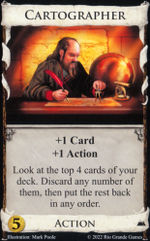
|

|
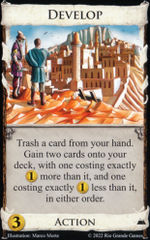
|
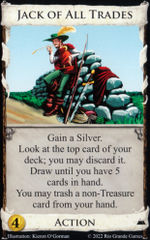
|
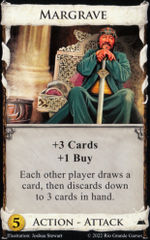
| ||||||||||
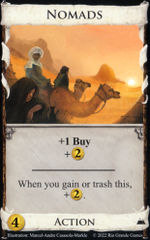
|
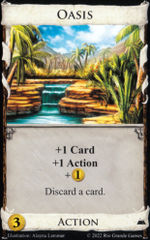
|
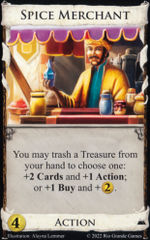
|
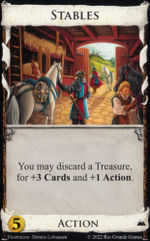
|
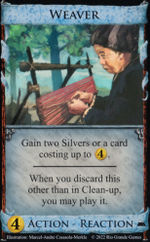
| ||||||||||
| Nomads | Oasis | Spice Merchant | Stables | Weaver | ||||||||||
| Bargains [images] | ||||||||||||||
|---|---|---|---|---|---|---|---|---|---|---|---|---|---|---|
| Border Village | Cauldron | Fool's Gold | Haggler | Highway | ||||||||||
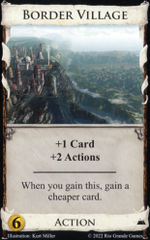
|
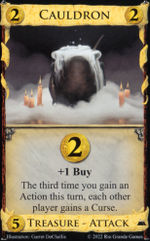
|

|
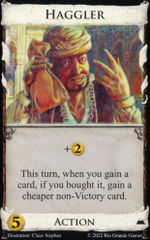
|
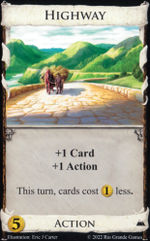
| ||||||||||
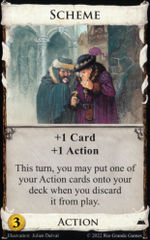
|
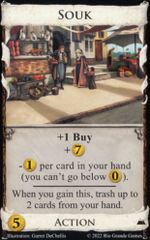
|
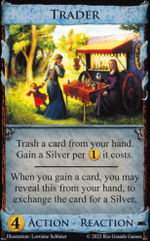
|
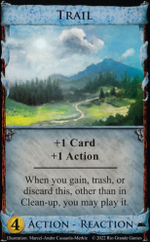
|
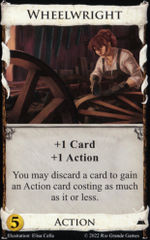
| ||||||||||
| Scheme | Souk | Trader | Trail | Wheelwright | ||||||||||
[edit] Hinterlands & Dominion
| Highway Robbery [images] | ||||||||||||||
|---|---|---|---|---|---|---|---|---|---|---|---|---|---|---|
| Cellar | Library | Moneylender | Throne Room | Workshop | ||||||||||
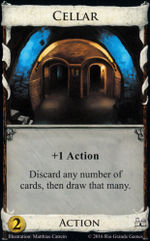
|
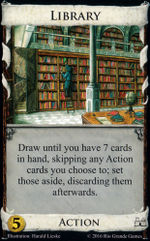
|

|
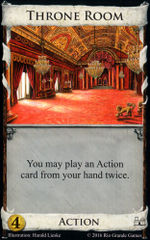
|
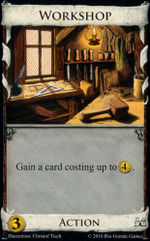
| ||||||||||
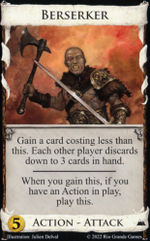
|

|

|

|

| ||||||||||
| Berserker | Highway | Nomads | Oasis | Trail | ||||||||||
| Adventures Abroad [images] | ||||||||||||||
|---|---|---|---|---|---|---|---|---|---|---|---|---|---|---|
| Festival | Laboratory | Remodel | Sentry | Vassal | ||||||||||
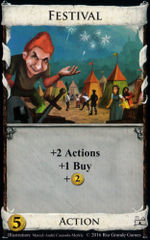
|
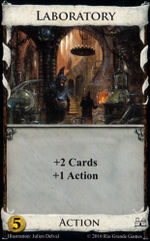
|
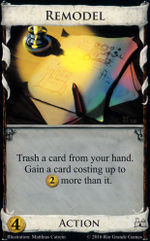
|
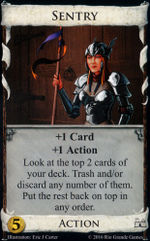
|

| ||||||||||

|

|
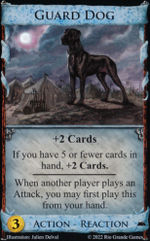
|

|
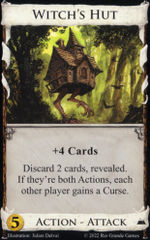
| ||||||||||
| Crossroads | Fool's Gold | Guard Dog | Souk | Witch's Hut | ||||||||||
[edit] Hinterlands & Intrigue
| Money for Nothing [images] | ||||||||||||||
|---|---|---|---|---|---|---|---|---|---|---|---|---|---|---|
| Replace | Patrol | Pawn | Shanty Town | Torturer | ||||||||||
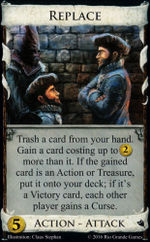
|
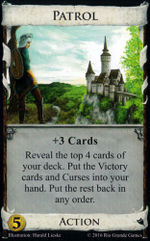
|
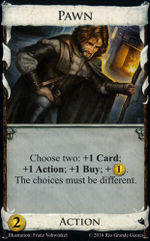
|
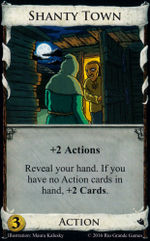
|
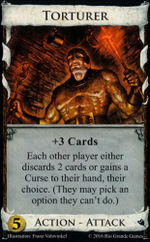
| ||||||||||

|

|
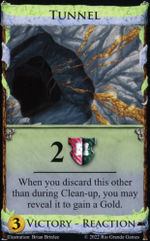
|

|

| ||||||||||
| Cartographer | Jack of All Trades | Tunnel | Weaver | Wheelwright | ||||||||||
| The Duke's Ball [images] | ||||||||||||||
|---|---|---|---|---|---|---|---|---|---|---|---|---|---|---|
| Conspirator | Duke | Harem | Masquerade | Upgrade | ||||||||||
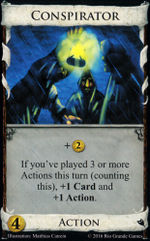
|
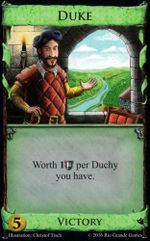
|
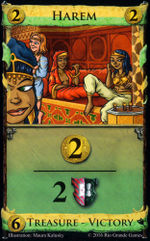
|
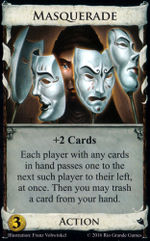
|
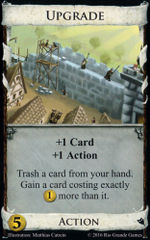
| ||||||||||

|

|
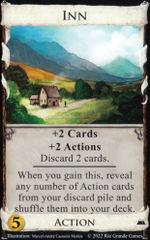
|

|

| ||||||||||
| Guard Dog | Haggler | Inn | Scheme | Trail | ||||||||||
[edit] Hinterlands & Seaside
| Travelers [images] | ||||||||||||||
|---|---|---|---|---|---|---|---|---|---|---|---|---|---|---|
| Cartographer | Crossroads | Farmland | Souk | Stables | ||||||||||

|

|
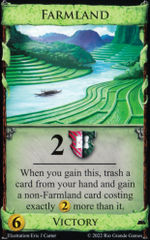
|

|

| ||||||||||
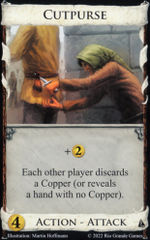
|
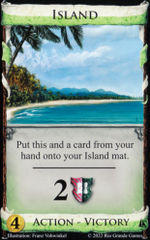
|
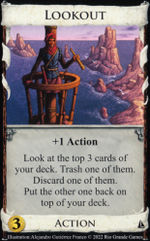
|
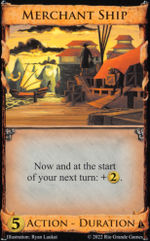
|
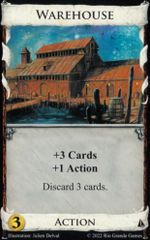
| ||||||||||
| Cutpurse | Island | Lookout | Merchant Ship | Warehouse | ||||||||||
| Runners [images] | ||||||||||||||
|---|---|---|---|---|---|---|---|---|---|---|---|---|---|---|
| Berserker | Cauldron | Guard Dog | Nomads | Wheelwright | ||||||||||

|

|

|

|

| ||||||||||
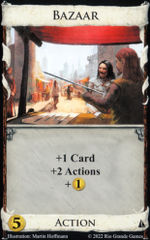
|
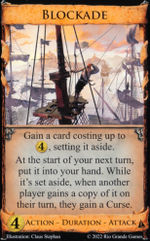
|
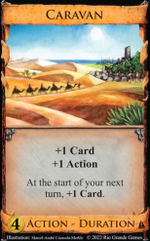
|
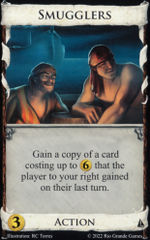
|

| ||||||||||
| Bazaar | Blockade | Caravan | Smugglers | Sailor | ||||||||||
[edit] Hinterlands & Alchemy
| Wine Country [images] | ||||||||||||||
|---|---|---|---|---|---|---|---|---|---|---|---|---|---|---|
| Apprentice | Familiar | Golem | University | Vineyard | ||||||||||
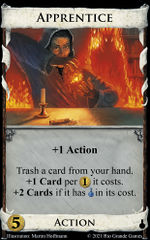
|
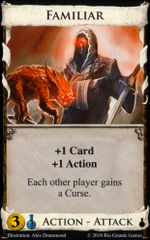
|
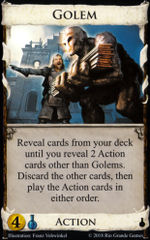
|
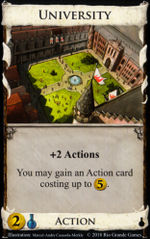
|
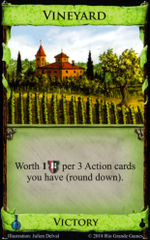
| ||||||||||

|

|

|

|

| ||||||||||
| Farmland | Guard Dog | Highway | Margrave | Nomads | ||||||||||
| Landscapes and Additional Cards | ||||||||||||||
| Potion | ||||||||||||||
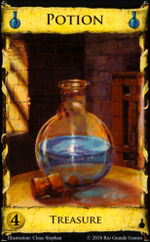
| ||||||||||||||
[edit] Hinterlands & Prosperity
| Instant Gratification [images] | ||||||||||||||
|---|---|---|---|---|---|---|---|---|---|---|---|---|---|---|
| Bishop | Expand | Hoard | Mint | Watchtower | ||||||||||
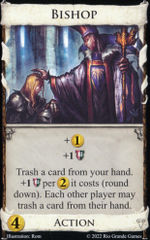
|
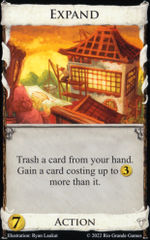
|
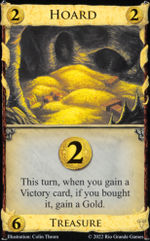
|
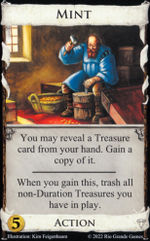
|
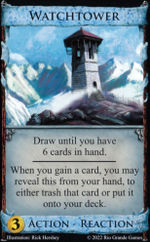
| ||||||||||

|

|

|

|

| ||||||||||
| Berserker | Cauldron | Haggler | Oasis | Trail | ||||||||||
| Landscapes and Additional Cards | ||||||||||||||
| Platinum | Colony | |||||||||||||
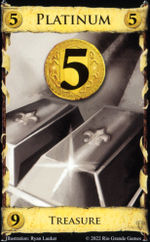
|
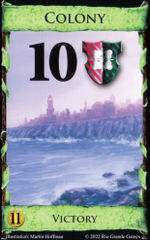
| |||||||||||||
| Treasure Trove [images] | ||||||||||||||
|---|---|---|---|---|---|---|---|---|---|---|---|---|---|---|
| Bank | Clerk | Crystal Ball | Monument | Tiara | ||||||||||
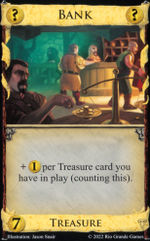
|
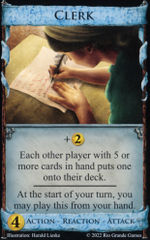
|
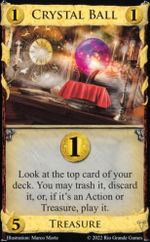
|
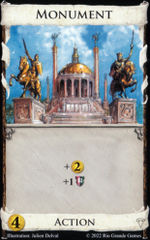
|

| ||||||||||

|

|

|

|

| ||||||||||
| Cauldron | Develop | Fool's Gold | Guard Dog | Inn | ||||||||||
| Landscapes and Additional Cards | ||||||||||||||
| Platinum | Colony | |||||||||||||

|

| |||||||||||||
[edit] Hinterlands & Cornucopia & Guilds
| Blue Harvest [images] | |||||||||||||||||
|---|---|---|---|---|---|---|---|---|---|---|---|---|---|---|---|---|---|
| Ferryman | Farrier | Hamlet | Horn of Plenty | Joust | |||||||||||||
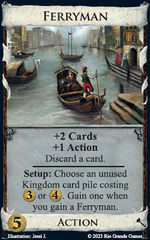
|
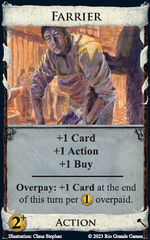
|
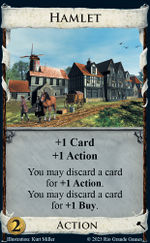
|
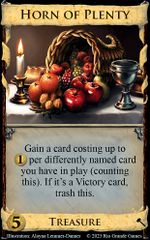
|
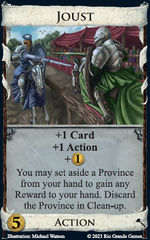
| |||||||||||||

|

|

|

|

| |||||||||||||
| Fool's Gold | Trail | Tunnel | Weaver | Witch's Hut | |||||||||||||
| Landscapes and Additional Cards | |||||||||||||||||
| Pile for Ferryman Guard Dog |
|||||||||||||||||

| |||||||||||||||||
| Exchanges [images] | ||||||||||||||
|---|---|---|---|---|---|---|---|---|---|---|---|---|---|---|
| Butcher | Herald | Soothsayer | Stonemason | Young Witch | ||||||||||
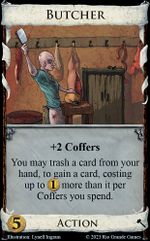
|
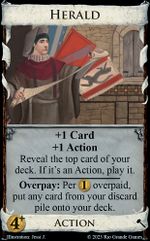
|
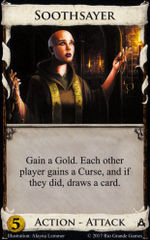
|
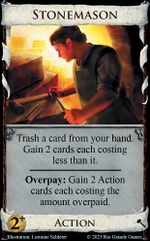
|
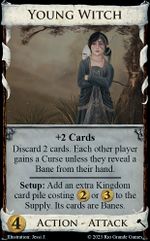
| ||||||||||

|

|

|

|

| ||||||||||
| Border Village | Cauldron | Develop | Stables | Trader | ||||||||||
| Landscapes and Additional Cards | ||||||||||||||
| Bane pile: Oasis |
||||||||||||||

| ||||||||||||||
[edit] Hinterlands & Dark Ages
| Far From Home [images] | |||||||||||||||||
|---|---|---|---|---|---|---|---|---|---|---|---|---|---|---|---|---|---|
| Cartographer | Develop | Fool's Gold | Weaver | Witch's Hut | |||||||||||||

|

|

|

|

| |||||||||||||

|
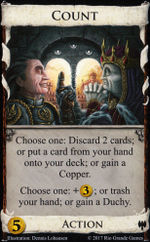
|
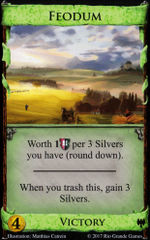
|
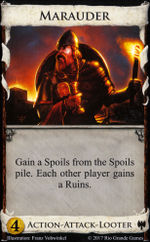
|
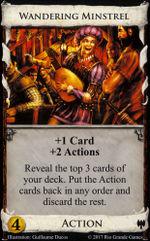
| |||||||||||||
| Beggar | Count | Feodum | Marauder | Wandering Minstrel | |||||||||||||
| Landscapes and Additional Cards | |||||||||||||||||
| Ruins | Shelters | ||||||||||||||||
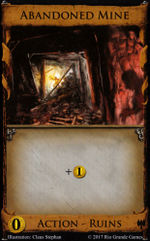
|
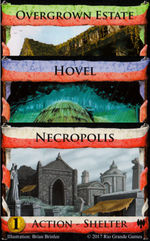
| ||||||||||||||||
| Expeditions [images] | |||||||||||||||||
|---|---|---|---|---|---|---|---|---|---|---|---|---|---|---|---|---|---|
| Nomads | Oasis | Scheme | Spice Merchant | Tunnel | |||||||||||||

|

|

|

|

| |||||||||||||
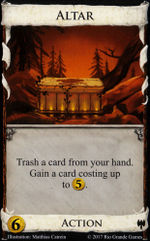
|
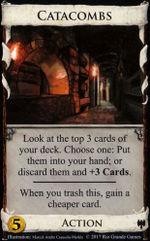
|
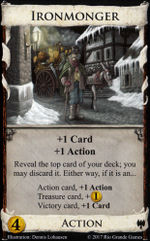
|
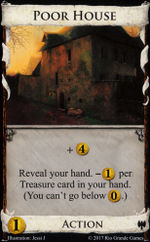
|
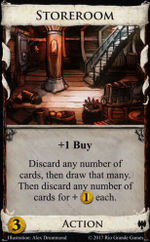
| |||||||||||||
| Altar | Catacombs | Ironmonger | Poor House | Storeroom | |||||||||||||
| Landscapes and Additional Cards | |||||||||||||||||
| Shelters | |||||||||||||||||

| |||||||||||||||||
[edit] Hinterlands & Adventures
| Traders and Raiders [images] | |||||||||||||||||
|---|---|---|---|---|---|---|---|---|---|---|---|---|---|---|---|---|---|
| Haunted Woods | Lost City | Page | Port | Wine Merchant | |||||||||||||
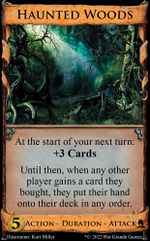
|
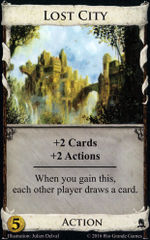
|
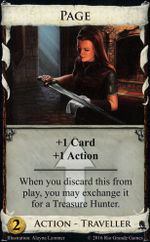
|
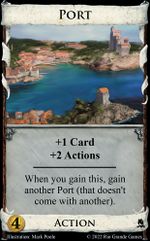
|
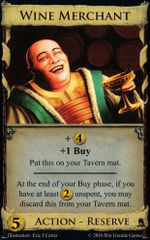
| |||||||||||||

|

|

|

|

| |||||||||||||
| Berserker | Guard Dog | Haggler | Spice Merchant | Trader | |||||||||||||
| Landscapes and Additional Cards | |||||||||||||||||
| Raid | |||||||||||||||||

| |||||||||||||||||
| Journeys [images] | ||||||||||||||||||||
|---|---|---|---|---|---|---|---|---|---|---|---|---|---|---|---|---|---|---|---|---|
| Bridge Troll | Distant Lands | Giant | Guide | Ranger | ||||||||||||||||
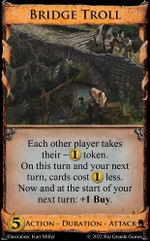
|
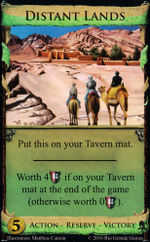
|
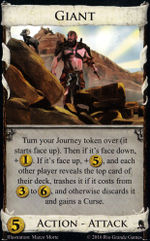
|
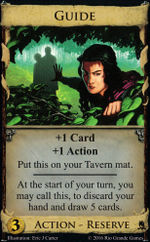
|
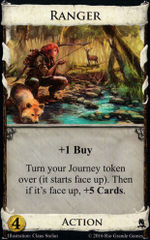
| ||||||||||||||||

|

|

|

|

| ||||||||||||||||
| Cartographer | Crossroads | Highway | Inn | Trail | ||||||||||||||||
| Landscapes and Additional Cards | ||||||||||||||||||||
| Expedition | Inheritance | |||||||||||||||||||

|

| |||||||||||||||||||
[edit] Hinterlands & Empires
| Simple Plans [images] | ||||||||||||||||||||
|---|---|---|---|---|---|---|---|---|---|---|---|---|---|---|---|---|---|---|---|---|
| Catapult | Forum | Patrician | Temple | Villa | ||||||||||||||||
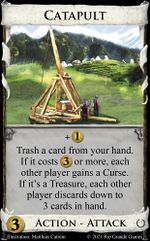
|
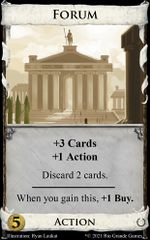
|
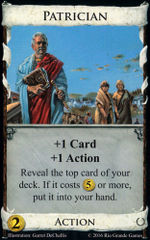
|
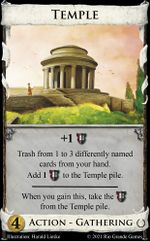
|
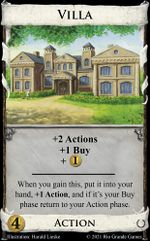
| ||||||||||||||||

|

|

|

|

| ||||||||||||||||
| Border Village | Cauldron | Haggler | Stables | Wheelwright | ||||||||||||||||
| Landscapes and Additional Cards | ||||||||||||||||||||
| Donate | Labyrinth | |||||||||||||||||||

|

| |||||||||||||||||||
| Expansion [images] | ||||||||||||||||||||
|---|---|---|---|---|---|---|---|---|---|---|---|---|---|---|---|---|---|---|---|---|
| Castles | Charm | Encampment | Engineer | Legionary | ||||||||||||||||
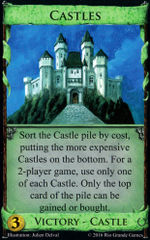
|
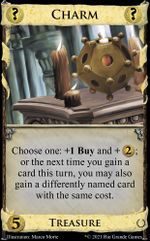
|
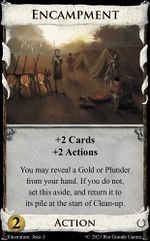
|
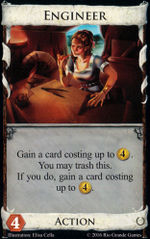
|
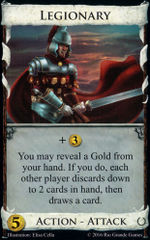
| ||||||||||||||||

|

|

|

|

| ||||||||||||||||
| Farmland | Oasis | Spice Merchant | Stables | Tunnel | ||||||||||||||||
| Landscapes and Additional Cards | ||||||||||||||||||||
| Battlefield | Fountain | |||||||||||||||||||

|

| |||||||||||||||||||
[edit] Hinterlands & Nocturne
| Search Party [images] | ||||||||||||||
|---|---|---|---|---|---|---|---|---|---|---|---|---|---|---|
| Cobbler | Conclave | Druid | Faithful Hound | Werewolf | ||||||||||
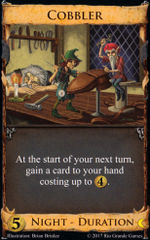
|
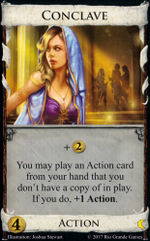
|
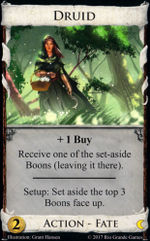
|
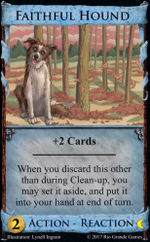
|
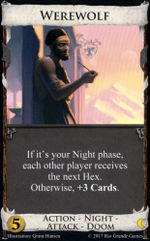
| ||||||||||

|

|

|

|

| ||||||||||
| Cartographer | Inn | Oasis | Scheme | Souk | ||||||||||
| Landscapes and Additional Cards | ||||||||||||||
| Boons | Hexes | |||||||||||||

|

| |||||||||||||
| Boons for Druid | ||||||||||||||
| The Mountain's Gift | The Sky's Gift | The Sun's Gift | ||||||||||||

|

|

| ||||||||||||
| Counting Sheep [images] | ||||||||||||||
|---|---|---|---|---|---|---|---|---|---|---|---|---|---|---|
| Crypt | Leprechaun | Pooka | Secret Cave | Shepherd | ||||||||||
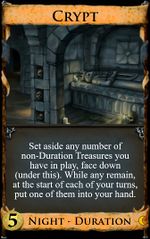
|
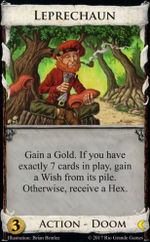
|
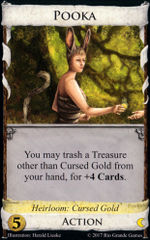
|
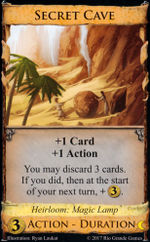
|
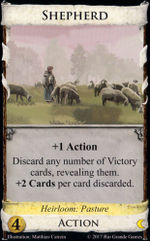
| ||||||||||

|

|

|

|

| ||||||||||
| Crossroads | Farmland | Oasis | Tunnel | Weaver | ||||||||||
| Landscapes and Additional Cards | ||||||||||||||
| Hexes | ||||||||||||||

| ||||||||||||||
[edit] Hinterlands & Renaissance
| Sweetened Deals [images] | ||||||||||||||||||||
|---|---|---|---|---|---|---|---|---|---|---|---|---|---|---|---|---|---|---|---|---|
| Flag Bearer | Lackeys | Mountain Village | Silk Merchant | Spices | ||||||||||||||||
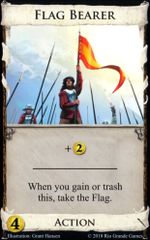
|
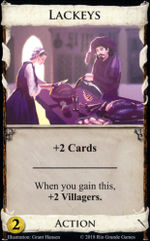
|

|
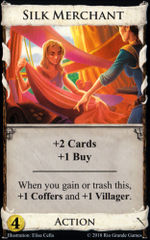
|
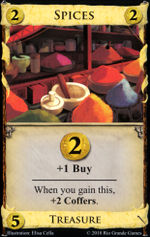
| ||||||||||||||||

|

|

|

|

| ||||||||||||||||
| Develop | Guard Dog | Haggler | Spice Merchant | Witch's Hut | ||||||||||||||||
| Landscapes and Additional Cards | ||||||||||||||||||||
| Silos | Flag | |||||||||||||||||||

|

| |||||||||||||||||||
| A Penny Saved [images] | |||||||||||||||||||||||
|---|---|---|---|---|---|---|---|---|---|---|---|---|---|---|---|---|---|---|---|---|---|---|---|
| Ducat | Patron | Scepter | Seer | Swashbuckler | |||||||||||||||||||
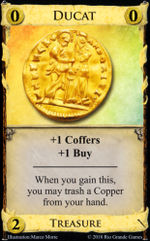
|

|
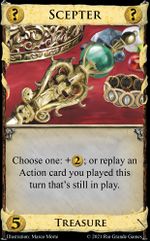
|
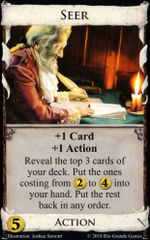
|
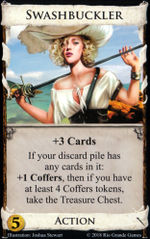
| |||||||||||||||||||

|

|

|

|

| |||||||||||||||||||
| Berserker | Border Village | Oasis | Souk | Trader | |||||||||||||||||||
| Landscapes and Additional Cards | |||||||||||||||||||||||
| Barracks | Guildhall | Treasure Chest | |||||||||||||||||||||

|

|

| |||||||||||||||||||||
[edit] Hinterlands & Menagerie
| Big Blue [images] | ||||||||||||||||||||
|---|---|---|---|---|---|---|---|---|---|---|---|---|---|---|---|---|---|---|---|---|
| Black Cat | Falconer | Sheepdog | Sleigh | Village Green | ||||||||||||||||
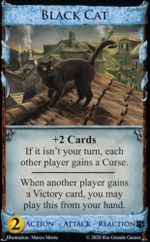
|
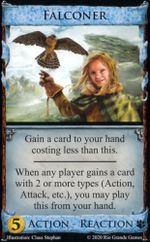
|

|
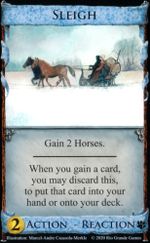
|
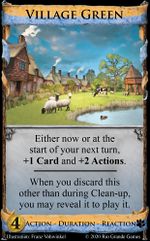
| ||||||||||||||||

|

|

|

|

| ||||||||||||||||
| Trader | Trail | Tunnel | Weaver | Witch's Hut | ||||||||||||||||
| Landscapes and Additional Cards | ||||||||||||||||||||
| Banish | Way of the Turtle | |||||||||||||||||||

|

| |||||||||||||||||||
| Intersection [images] | ||||||||||||||||||||
|---|---|---|---|---|---|---|---|---|---|---|---|---|---|---|---|---|---|---|---|---|
| Cardinal | Hostelry | Livery | Mastermind | Supplies | ||||||||||||||||
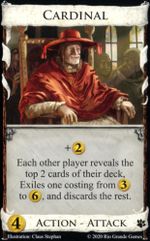
|
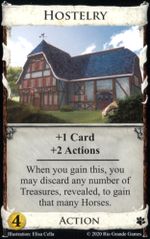
|
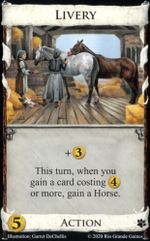
|
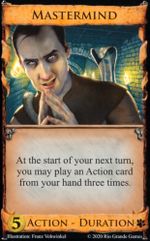
|
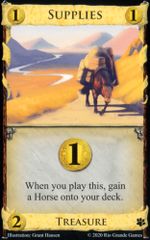
| ||||||||||||||||

|

|

|

|

| ||||||||||||||||
| Develop | Farmland | Nomads | Stables | Wheelwright | ||||||||||||||||
| Landscapes and Additional Cards | ||||||||||||||||||||
| Gamble | Way of the Mouse | |||||||||||||||||||

|

| |||||||||||||||||||
Set-aside card for Mouse is Crossroads
[edit] Hinterlands & Allies
| Longest Tunnel [images] | |||||||||||||||||
|---|---|---|---|---|---|---|---|---|---|---|---|---|---|---|---|---|---|
| Bauble | Capital City | Carpenter | Contract | Innkeeper | |||||||||||||
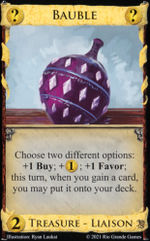
|
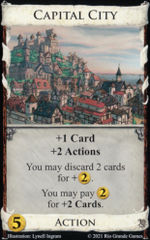
|

|
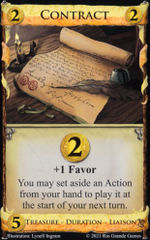
|
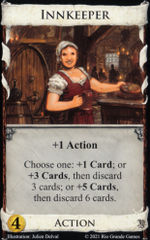
| |||||||||||||

|

|

|

|

| |||||||||||||
| Haggler | Jack of All Trades | Margrave | Trail | Tunnel | |||||||||||||
| Landscapes and Additional Cards | |||||||||||||||||
| Fellowship of Scribes | |||||||||||||||||

| |||||||||||||||||
| Expertise [images] | |||||||||||||||||
|---|---|---|---|---|---|---|---|---|---|---|---|---|---|---|---|---|---|
| Barbarian | Highwayman | Specialist | Townsfolk | Underling | |||||||||||||
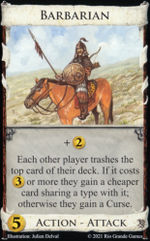
|
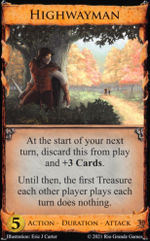
|
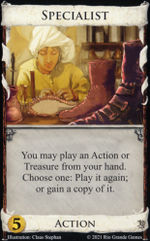
|
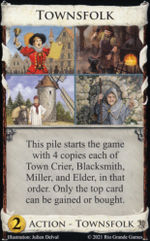
|
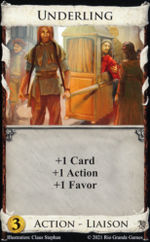
| |||||||||||||

|

|

|

|

| |||||||||||||
| Border Village | Crossroads | Highway | Inn | Spice Merchant | |||||||||||||
| Landscapes and Additional Cards | |||||||||||||||||
| Order of Masons | |||||||||||||||||

| |||||||||||||||||
[edit] Hinterlands & Plunder
| Desert Dreams [images] | |||||||||||||||||
|---|---|---|---|---|---|---|---|---|---|---|---|---|---|---|---|---|---|
| Enlarge | Grotto | Harbor Village | Mapmaker | Pendant | |||||||||||||
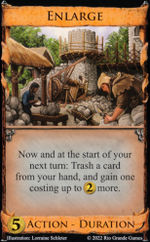
|

|
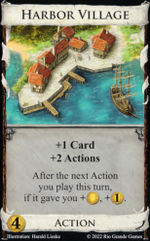
|
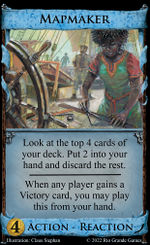
|

| |||||||||||||

|

|

|

|

| |||||||||||||
| Haggler | Nomads | Oasis | Souk | Weaver | |||||||||||||
| Landscapes and Additional Cards | |||||||||||||||||
| Trait for Nomads Reckless |
|||||||||||||||||

| |||||||||||||||||
| Viking Schemes [images] | ||||||||||||||||||||
|---|---|---|---|---|---|---|---|---|---|---|---|---|---|---|---|---|---|---|---|---|
| Cabin Boy | Crew | Crucible | Frigate | Wealthy Village | ||||||||||||||||
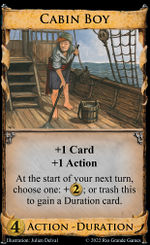
|
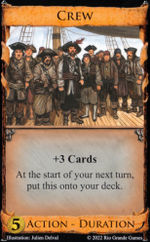
|
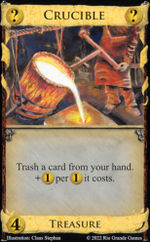
|
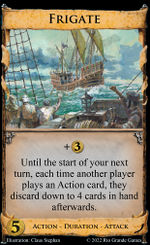
|
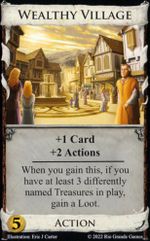
| ||||||||||||||||

|

|

|

|

| ||||||||||||||||
| Berserker | Cauldron | Fool's Gold | Scheme | Stables | ||||||||||||||||
| Landscapes and Additional Cards | ||||||||||||||||||||
| Trait for Berserker Rich |
Scrounge | |||||||||||||||||||

|

| |||||||||||||||||||
[edit] First Edition Kingdoms
First Edition Kingdoms | |||||||||||||||||||||||||||||||||||||||||||||||||||||||||||||||||||||||||||||||||||||||||||||||||||||||||||||||||||||||||||||||||||||||||||||||||||||||||||||||||||||||||||||||||||||||||||||||||||||||||||||||||||||||||||||||||||||||||||||||||||||||||||||||||||||||||||||||||||||||||||||||||||||||||||||||||||||||||||||||||||||||||||||||||||||||||||||||||||||||||||||||||||||||||||||||||||||||||||||||||||||||||||||||||||||||||||||||||||||||||||||||||||||||||||||||||||||||||||||||||||||||||||||||||||||||||||||||||||||||||||||||||||||||||||||||||||||||||||||||||||||||||||||||||||||||||||||||||||||||||||||||||||||||||||||||||||||||||||||||||||||||||||||||||||||||||||||||||||||||||||||||||||||||||||||||||||||||||||||||||||||||||||||||||||||||||||||||||||||||||||||||||||||||||||||||||||||||||||||||||||||||||||||||||||||||||||||||||||||||||||||||||||||||||||||||||||||||||||||||||||||||||||||||||||||||||||||||||||||||||||||||||||||||||||||||||||||||||||||||||||||||||||||||||||||||||||||||||||||||
[edit] Hinterlands 1E by itself
Second Edition Changes: out – Cache, Nomad Camp, Haggler; in – Cartographer, Nomads, Weaver
Second Edition Changes: out – Cache, Duchess, Nomad Camp, Spice Merchant; in – Cauldron, Souk, Trail, Wheelwright
This kingdom was completely removed.
This kingdom was completely removed. [edit] Hinterlands 1E & Dominion 2E
Second Edition Changes: name – "Happy Trails"" out – Inn, Noble Brigand, Margrave; in – Berserker, Nomads, Trail
Second Edition Changes: out – Farmland, Oracle, Spice Merchant; in – Guard Dog, Souk, Witch's Hut [edit] Hinterlands 1E & Intrigue 2E
Second Edition Changes: out – Cache, Silk Road; in – Weaver, Wheelwright
Second Edition Changes: out – Duchess, Haggler, Noble Brigand; in – Guard Dog, Trail, Wheelwright [edit] Hinterlands 1E & Seaside 1E
Second Edition Changes: out – Silk Road; in – Souk
Second Edition Changes: out – Ambassador, Embargo, Embassy, Farmland, Ill-Gotten Gains, Noble Brigand, Trader; in – Berserker, Blockade, Cauldron, Guard Dog, Nomads, Sailor, Wheelwright [edit] Hinterlands 1E & Alchemy
Second Edition Changes: out – Crossroads, Haggler, Nomad Camp; in – Guard Dog, Margrave, Nomads
This kingdom was completely removed. [edit] Hinterlands 1E & Cornucopia
Second Edition Changes: out – Mandarin, Noble Brigand, Nomad Camp; in – Trail, Weaver, Witch's Hut
This kingdom was completely removed. [edit] Hinterlands 1E & Dark Ages
Second Edition Changes: out – Embassy, Haggler; in – Weaver, Witch's Hut
Second Edition Changes: out – Crossroads, Farmland, Highway; in – Nomads, Oasis, Scheme [edit] Hinterlands 1E & Guilds
Second Edition Changes: out – Ill-Gotten Gains; in – Cauldron
This kingdom was completely removed. [edit] Hinterlands 1E & Adventures
Second Edition Changes: out – Develop, Farmland; in – Berserker, Guard Dog
Second Edition Changes: out – Silk Road; in – Trail [edit] Hinterlands 1E & Empires
Second Edition Changes: out – Develop, Ill-Gotten Gains; in – Cauldron, Wheelwright
Second Edition Changes: out – Cache, Highway; in – Oasis, Stables [edit] Hinterlands 1E & Nocturne
Second Edition Changes: out – Highway; in – Souk
Second Edition Changes: out – Haggler, Noble Brigand; in – Oasis, Weaver [edit] Hinterlands 1E & Renaissance
Second Edition Changes: out – Cartographer, Farmland; in – Guard Dog, Witch's Hut
Second Edition Changes: out – Cache, Crossroads, Noble Brigand; in – Berserker, Border Village, Souk [edit] Hinterlands 1E & Menagerie
Second Edition Changes: out – Cartographer, Fool's Gold, Margrave; in – Trail, Weaver, Wheelwright
Set-aside card for Mouse is Crossroads Second Edition Changes: out – Haggler, Nomad Camp; in – Nomads, ‘’Wheelwright [edit] Hinterlands 1E & Allies
Second Edition Changes: out – Farmland; in – ‘'Trail | |||||||||||||||||||||||||||||||||||||||||||||||||||||||||||||||||||||||||||||||||||||||||||||||||||||||||||||||||||||||||||||||||||||||||||||||||||||||||||||||||||||||||||||||||||||||||||||||||||||||||||||||||||||||||||||||||||||||||||||||||||||||||||||||||||||||||||||||||||||||||||||||||||||||||||||||||||||||||||||||||||||||||||||||||||||||||||||||||||||||||||||||||||||||||||||||||||||||||||||||||||||||||||||||||||||||||||||||||||||||||||||||||||||||||||||||||||||||||||||||||||||||||||||||||||||||||||||||||||||||||||||||||||||||||||||||||||||||||||||||||||||||||||||||||||||||||||||||||||||||||||||||||||||||||||||||||||||||||||||||||||||||||||||||||||||||||||||||||||||||||||||||||||||||||||||||||||||||||||||||||||||||||||||||||||||||||||||||||||||||||||||||||||||||||||||||||||||||||||||||||||||||||||||||||||||||||||||||||||||||||||||||||||||||||||||||||||||||||||||||||||||||||||||||||||||||||||||||||||||||||||||||||||||||||||||||||||||||||||||||||||||||||||||||||||||||||||||||||||||||
